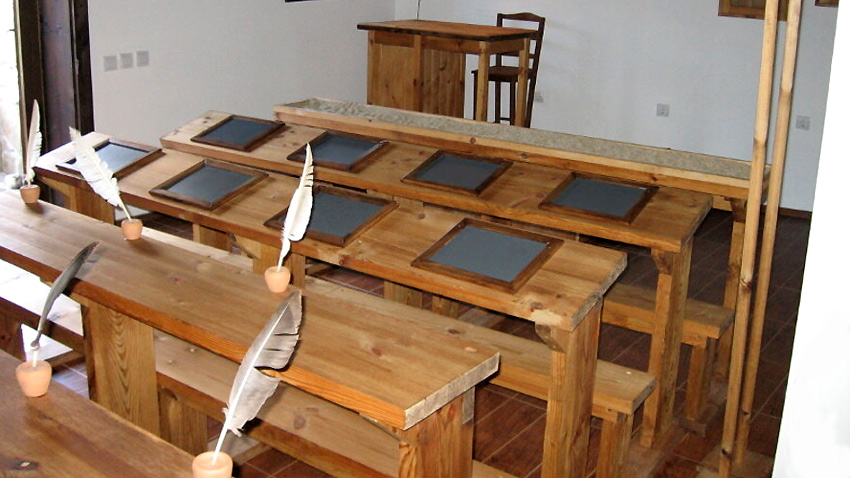“Read and know, so that you will not be ridiculed and reproached by other tribes and peoples. It has cost me much labour to collect from different books and histories until I accumulated and brought together the history of the Bulgarian kin in this little book for your benefit and praise. I wrote it for you, who love your people and the Bulgarian fatherland and who wish to know about your kin and your tongue. Copy this little book of history and pay to those who know how to write to copy it for you and take good care that it does not disappear!”
This is what Istoriya Slavyanobolgarskaya or Slavic-Bulgarian history, written more than two centuries ago by Saint Paisius of Hilendar reads. He is one of the most talented figures in Bulgarian history who contributed to the awakening of the national self-consciousness of Bulgarians during the National Revival. The work of Paisius continues to be a reason for pride and admiration among patriotic Bulgarians. This is evidenced by the flow of tourists visiting the newest museum in Koprivshtitsa, which presents the town as a center of enlightenment during the National Revival. The museum is in the Dorosieva House, set in the typical Koprivshtitsa style. Svetlana Muhova, curator at the Museums Directorate in the city told Radio Bulgaria more.
"We show here the history of Koprivshtitsa and the Revival period, starting from the times of the mutual instruction schools. It is a form of education, which was preserved in Bulgaria even after the fall of this country under Ottoman rule. In Medieval Bulgaria, we have had great philosophical schools, but after the Ottoman invasion these highly educated scholars left the country. Their work faded but monastic schools were preserved and they preserved the Bulgarian culture and script through the centuries. Therefore, we should speak with respect for monastic schools, as they maintained literacy among the population, and in Koprivshtitsa they were established in the 16th and 18th centuries. That is what preserved the Bulgarian scripture and faith, and later people such as Paisii awakened the national consciousness of Bulgarians. The Bulgarian revolutionaries themselves could not have existed without these spiritual allies, who for centuries kept the Bulgarian spirit despite oppression.”
 “In the Koprivshtitsa Museum of Education, one can see how a monastic school and a mutual instruction school looked like. The mutual-instruction schools were more secular-oriented. At the end of the 18th and the 19th centuries the schools separated from monasteries and churches and many craftsmen and other literate people became teachers. There were shoemakers, painters, etc. who taught students their craft along with reading and writing. "We have shown this type of school here. One can see a work table of a craftsman and next to it there is a table with religious books," Svetlana Muhova says and adds:
“In the Koprivshtitsa Museum of Education, one can see how a monastic school and a mutual instruction school looked like. The mutual-instruction schools were more secular-oriented. At the end of the 18th and the 19th centuries the schools separated from monasteries and churches and many craftsmen and other literate people became teachers. There were shoemakers, painters, etc. who taught students their craft along with reading and writing. "We have shown this type of school here. One can see a work table of a craftsman and next to it there is a table with religious books," Svetlana Muhova says and adds:
"The highest stage in the development of education during the National Revival in Koprivshtitsa was the founding of the Naiden Gerov School in 1846. Here, after the house of Naiden Gerov that used to be a museum was returned to the heirs, for a long time, his life and work stopped being presented in exhibitions. That is why a special hall of Naiden Gerov was created in the Museum of Education. He is one of the greatest pedagogues of the National Revival and he put the beginning of Bulgarian poetry with his poem "Stoyani Rada" and later he compiled the first dictionary of Bulgarian language - a colossal work for the time he lived in. Several parts of the dictionary were published when he was still alive, and after his death nephew Teodor Panchev published the rest of the works gathered by Nayden Gerov throughout his life. It was these people who were the teachers of the ideologists of the Bulgarian liberation struggle - Kableshkov, Benkovski, Karavelov. Koprivshtitsa is not only a town where a number of revolutionaries were born, but also people who were to head newly liberated Bulgaria, such as Petko Karavelov, Rashko Madzharov, Joakim Gruev and Georgi Gruev. They have been raised to have this sense of duty towards the Fatherland and towards parents and families. This sense of duty was actually part of the consciousness of every Bulgarian back then."
English: Alexander Markov
Quiet among the Lyulin Mountain slopes, the Klisura Monastery of St. Petka is marked by mystery and radiates spirituality. It is located only 7 km from the resort town of Bankya, near the village of Klisura. Winter is the time when the holy monastery..
Today, The Bulgarian Orthodox Church honors the memory of Saint John the Baptist, also known as Saint John the Forerunner, because he prepared people for the coming of the Savior. The day dedicated to Saint John the Baptist, known in Bulgaria as..
On January 6, the Bulgarian Orthodox Church is marking Epiphany. According to the Bible, on this day John the Baptist baptized Jesus Christ in the Jordan River. Traditionally, a festive Epiphany liturgy is held in churches, water is blessed, and then..
Today, The Bulgarian Orthodox Church honors the memory of Saint John the Baptist, also known as Saint John the Forerunner, because he prepared people for..
Quiet among the Lyulin Mountain slopes, the Klisura Monastery of St. Petka is marked by mystery and radiates spirituality. It is located only 7 km from..

+359 2 9336 661
